

 MASS OPENS SECOND SPECIAL ASSEMBLY
MASS OPENS SECOND SPECIAL ASSEMBLY
FOR AFRICA OF THE BISHOPS SYNOD
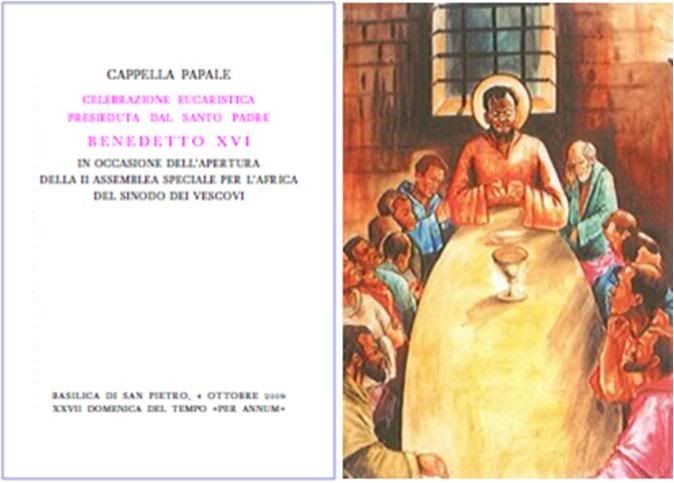
At 9:30 this morning, XXIII Sunday in ordinary time, the Holy Father presided at a Eucharistic celebration in St. Peter's Basilica with the Synodal fathers on the occasion of the opening of the Second Special Assembly for Africa of the Bishops' Synod.
Concelebrating were 239 Synodal bishops and 55 priests working with this Synodal assembly.
For the Eucharistic prayer, the principal concelebrants who joined the Pope were the three president-delegates of the Assembly - Cardinals Francis Arinze, emeritus Prefect of the Congregation for Divine Worship; Wilfrid Fox Napier, O.F.M., Archbishop of Durban (South Africa); and Théodore-Adrien Sarr, Archbishop of Dakar (Senegal); along with the General Moderator, Cardinal Peter Kodwo Appiah Turkson, Archbishop of Cape Coast (Ghana); the Secretary General of the Bishops' Synod, Mons. Nikola Eterović; and the two special secretaries for the assembly, Mons. Damião António Franklin, Arcivescovo of Luanda (Angola); and Mons. Edmond Djitangar, Bishop of Sarth (Chad).
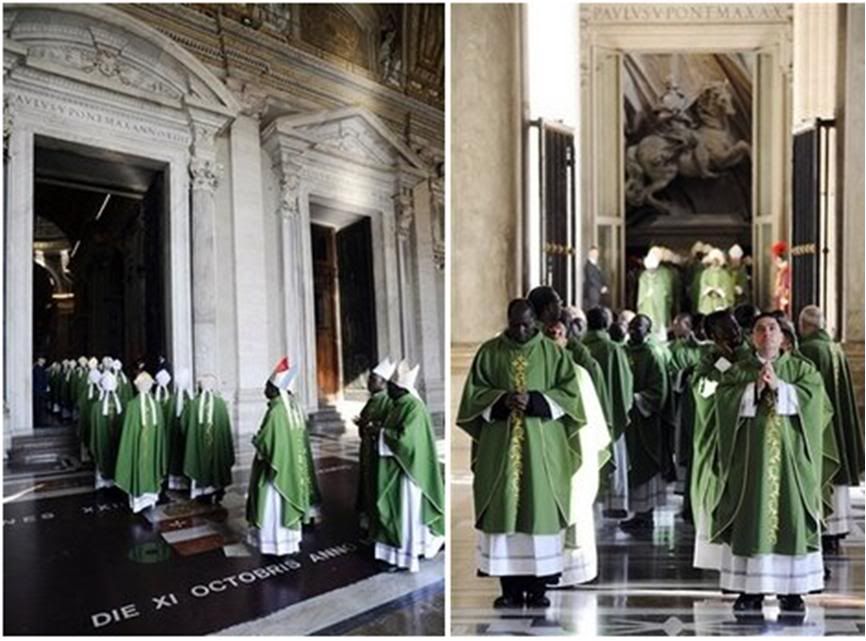
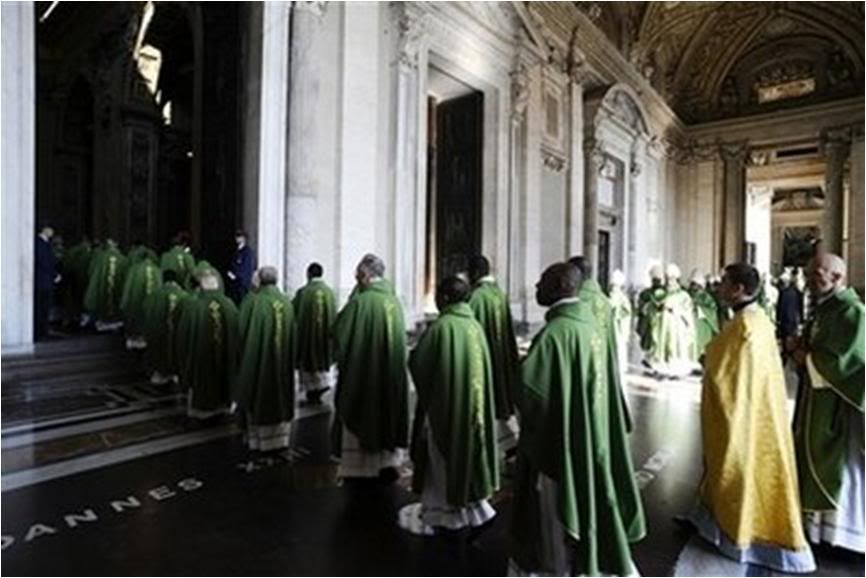
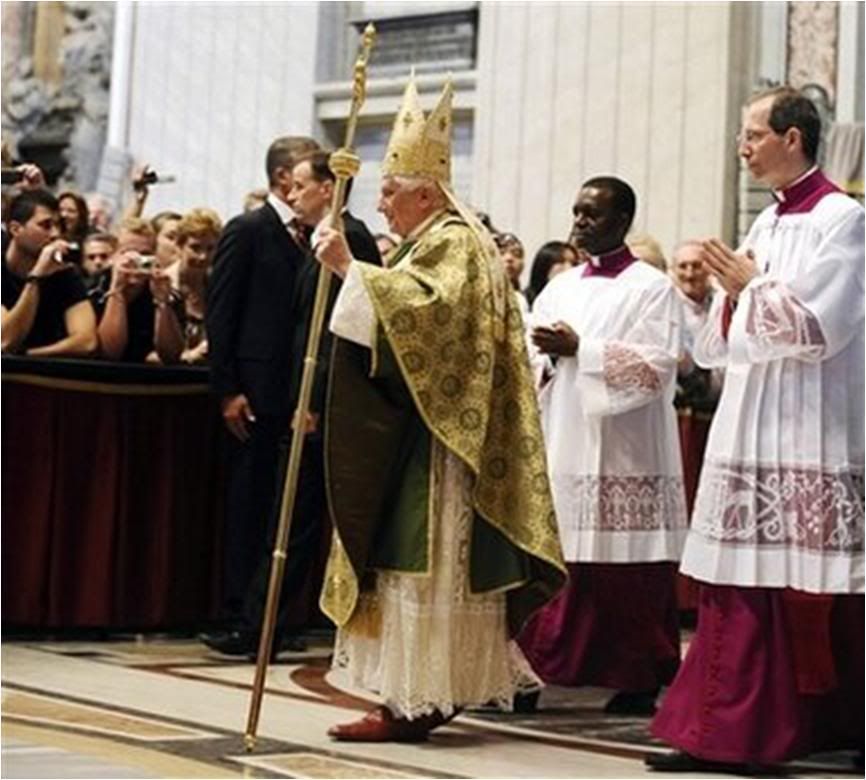
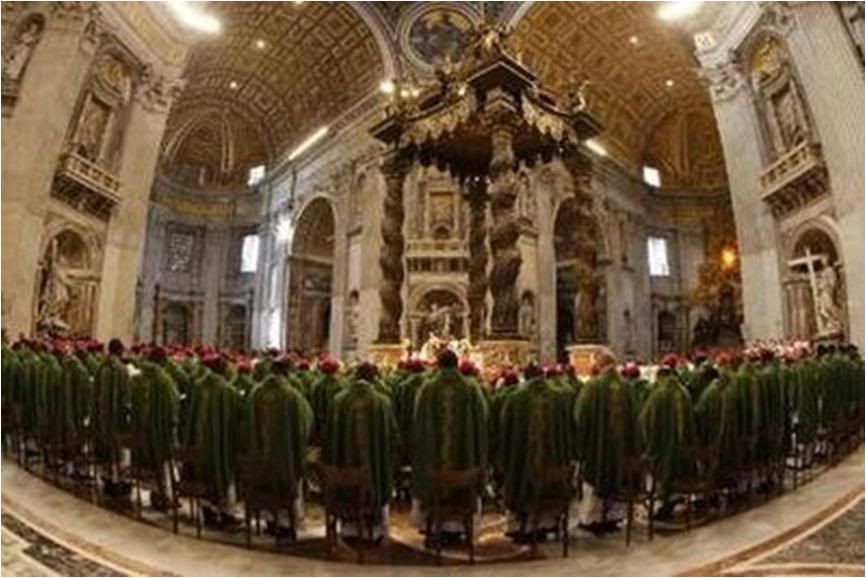 Pope says Africa is world's spiritual lung
Pope says Africa is world's spiritual lung
but harmed by materialism and fundamentalism

VATICAN CITY, Oct. 4 (AP) — Pope Benedict opened a special meeting of bishops on Africa on Sunday by praising the continent as the world's spiritual center but lamenting that it risks being afflicted by materialism and religious fundamentalism.
A Congolese choir — with bongo drums, electric guitars and swaying, ululating singers — filled St. Peter's Basilica with African hymns as Benedict formally opened the synod, a three-week gathering of some 300 prelates to discuss the church's problems in Africa.
Benedict praised Africa's rich cultural and spiritual treasures, saying they were the "spiritual lung" for a world increasingly in a crisis of faith and hope.
But he said Africa has also been afflicted by materialism — the "toxic spiritual garbage" exported by developed countries. "In this sense, colonialism — while finished in the political sphere — hasn't really ended," he said.
As a result, Africa is also at risk for increasing religious fundamentalism. Groups claiming to be from religious backgrounds are spreading across the continent.
"They are doing so in the name of God, but with a logic that is opposed to divine logic: teaching and working not with love and respect for freedom, but with intolerance and violence," he said.
He urged the Catholic Church in Africa to be a voice of reconciliation, justice and peace among the continent's various ethnic and religious groups.
The Catholic Church is growing enormously in Africa; between 1978 and 2007, the number of Catholics grew from 55 million to 146 million. Vatican statistics show that more than 17 percent of Africa's population is Catholic.
But at the same time, the region's poverty, conflicts and AIDS have posed challenges for the church.
Among the thorny issues that bishops might raise at the synod is the Vatican's ban on condom use. Many say condoms could help prevent the spread of AIDS on the continent.
[This is the writer injecting his own political agenda into this report.]
During the meeting, several outside experts will be addressing the prelates, including the head of the U.N.-African Union peacekeeping force for Darfur, Sudan, and the head of the U.N. Food and Agriculture Organization [who is Muslim].
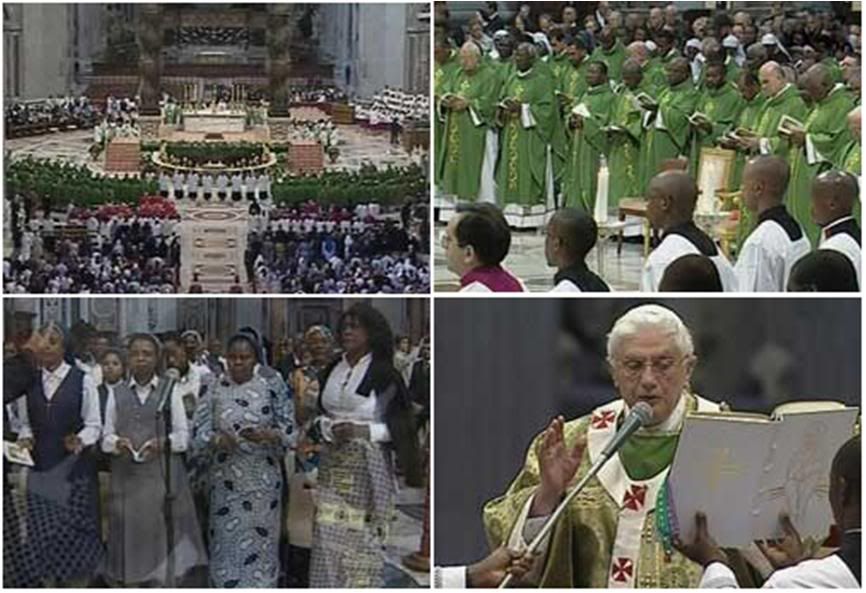
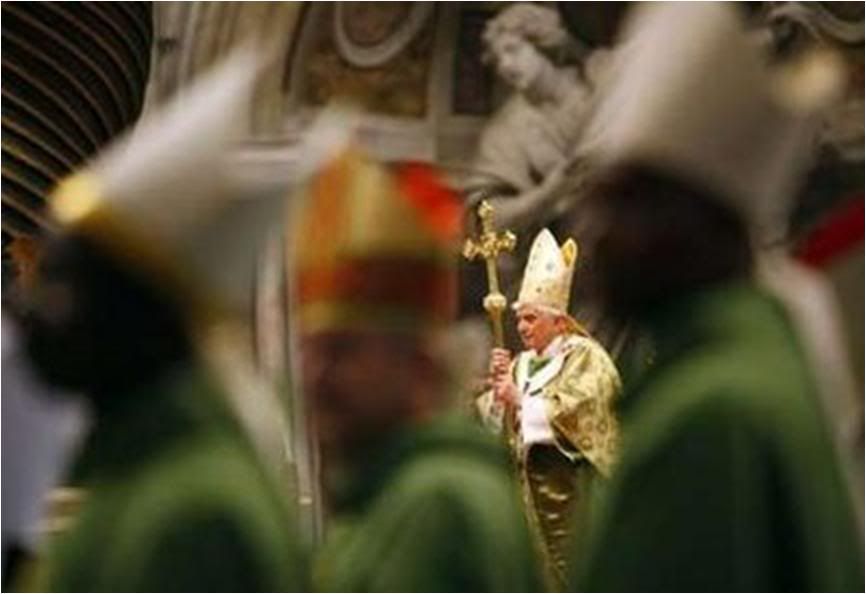
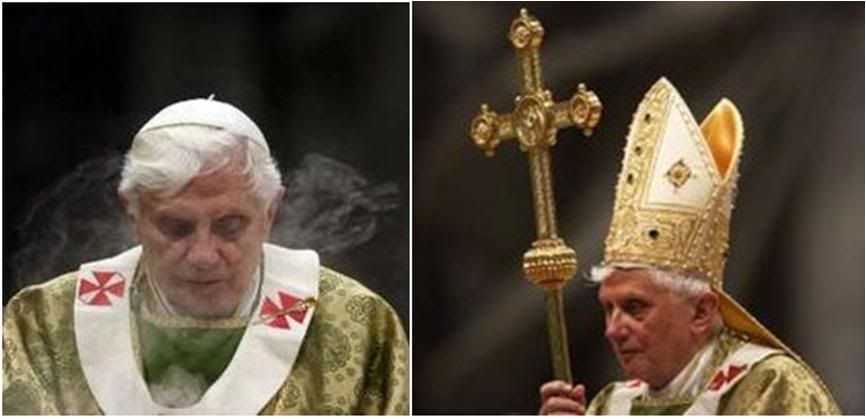
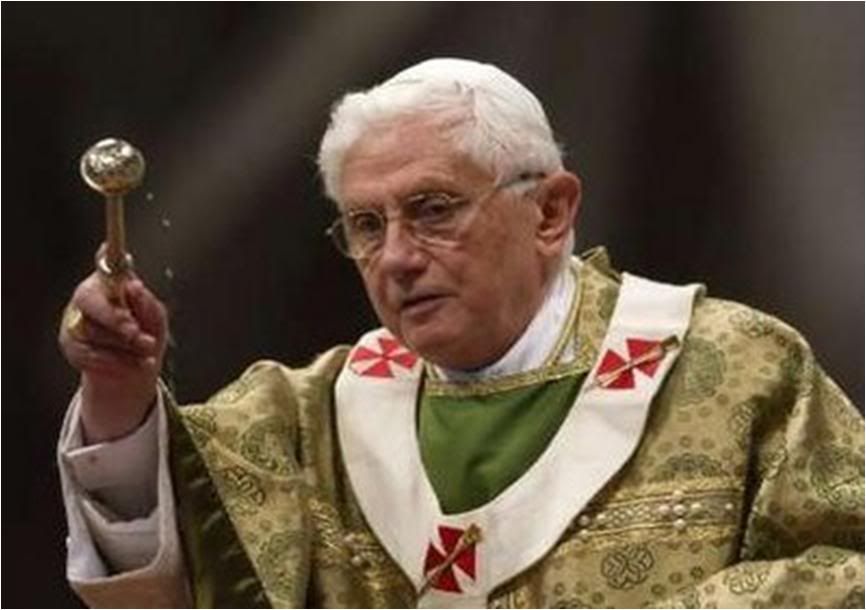
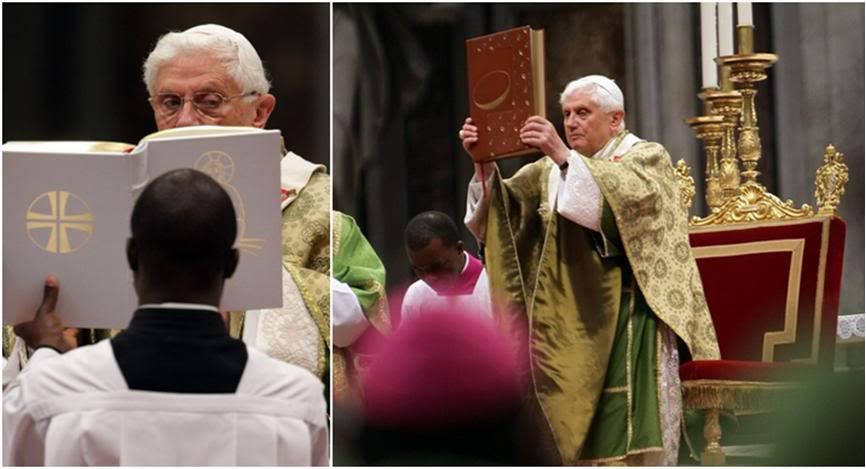 Here is a translation of the Holy Father's homily:
Here is a translation of the Holy Father's homily:
THE HOLY FATHER'S HOMILY
Venerated Brothers in the Episcopate and Priesthood,
Distinguished ladies and gentlemen,
Dear brothers and sisters!
Pax vobis – peace be with you!
With this liturgical greeting I address all of you gathered here in the Vatican Basilica where, 15 years ago, on April 10, 1994, the Servant of God John Paul II opened the first Special Assembly for Africa of the Bishops' Synod.
The fact that we find ourselves here today to inaugurate the second means that the first was a historic event but not an isolated one. It was the first goal in a journey that has gone on and now reaches a new significant stage of verification and renewal. For this let us praise the Lord!
I address my most hertfelt welcome to the members of the Synodal assembly who are concelebrating this Holy Eucharist with me, and to the experts and auditors, particularly those who come from African lands. I greet with special acknowledgment the Secretary General of the Synod and his co-workers.
I am very happy for the presence among us of His Holiness Abuna Paulos, Patriarch of the Tewanedo Orthodox Church of Ethiopia, whom I cordially thank, and the fraternal delegates from other churches and ecclesial communities.
Likewise, I am happy to welcome the civilian authorities and the distinguished ambassadors who are with us for this occasion. With affection, I greet the priests, religious, representatives of Church, organisms, movements and associations, and the Congolese choir which, together with the Sistine Choir, animate our celebration today.
The Biblical readings this Sunday speak of matrimony. But more radically, they speak of the design of creation, of the origins, and therefore, of God. The second Reading, taken from the letter to the Hebrews, converges with this theme where it says: "He who consecrates [namely, Jesus Christ] and those who are being consecrated all have one origin. Therefore, he is not ashamed to call them brothers" (Heb 2,11).
The entire readings then highlight in evident ways the primacy of God the Creator, with the perennial validity of his original imprint and the absolute precedence of his lordship - that lordship which children know better to accept than adults, which is why Jesus points to them as the model for entering the kingdom of the heavens (cfr Mt 10,13-15).
Acknowledgment of the absolute lordship of God is certainly one of the outstanding and unifying traits of African culture. Naturally, AFrica has many diverse cultures, but all seem to agree on this point: God is the Creator and source of life.
Life, as we know very well, is manifested primarily in the union between a man and a woman and in the birth of children arising from that union. Divine law, written in Nature, is therefore stronger and pre-eminent over every human law, according to the clear and concise statement by Jesus: "What God has joined together, no human being must separate" (Mk 10,9). The perspective is not primarily moral: Before it is a duty, it has to do with 'being' itself, the order inscribed in Creation.
Dear brothers and sisters, in this sense, today's liturgy of the Word - beyond the first impression - is particularly appropriate to accompany the opening of a Synodal assembly dedicated to Africa. I would underscore in particular some aspects which emerge forcefully and which concern the work which we face.
The first which I have already referred to is the primacy of God, Creator and Lord. The second is matrimony. The third - children.
On the first aspect, Africa is the repository of an inestimable treasure for the entire world: her profound sense of God, which I had occasion to perceive directly in my meetings with African bishops on ad limina visit, and even more during the recent apostolic trip to Cameroon and Angola, of which I have grateful and emotional memories.
It is to that prilgrimage to African lands that I wish to refer now, because at that time, I ideally opened this Synodal assembly in handing over the Instrumentum laboris to the presidents of the bishops' conferences and to the heads of the Bishops' Synod of the Oriental Catholic Churches.
When we talk about Africa's treasures, we think right away of the resources in which your territory is rich, and which, unfortunately, have become - and will perhaps continue to be - a cause of exploitation, conflicts and corruption.
But the Word of God makes us look at another patrimony - the spiritual and cultural, which mankind needs even more than raw materials. In fact, Jesus says, "What profit is there for one to gain the whole world and forfeit his life?" (Mk 8,36).
From this point of view, Africa represents an immense spiritual 'lung' for mankind which appears to be in a crisis of faith and hope.
But even this lung can become sick. At the moment, at least two dangerous pathologies are eating at it: first of all, an ailment already wqidespread in the Western world, which is practical materialism, combined with relativist and nihilist thinking.
Without entering into the genesis of such spiritual evils, it is nonetheless indisputable that the so-called First World has often exported and is exporting toxic spiritual wastes which infect the peoples of other continents, Africa among them.
In this sense, colonialism, which is finished on the political level, has never been really terminated. Precisely in this perspective, one can point out the second 'virus' that could also undermine Africa, namely, religious fundamentalism mixed in with political and economic interests.
Groups belonging to various religious affiliations are spreading throughout the African continent – they do so in the name of God but following a logic opposed to the divine, teaching and practicing not love and respect of freedom, but intolerance and violence.
On the subject of matrimony, Chapter 2 of Genesis reminds us of its perennial foundation, which Jesus himself confirmed: “That is why a man leaves his father and mother and clings to his wife, and the two of them become one body” (Gn 3,24).
How can we not remember the admirable cycle of catecheses that the Servant of God John Paul II dedicated to this subject, in an exegesis in depth of this Biblical text?
Today, as proposed to us at the opening of this Synod, the liturgy offers us the super-abundant light of truth revealed and incarnated in Christ, with which we may consider the complex subject of matrimony in the ecclesial and cultural context of Africa.
Even on this point, I wish to take up briefly a suggestion that precedes every reflection and instruction of a moral type, and which also links to the primacy of the sense of the sacred, and of God.
Matrimony, as the Bible presents it to us, does not exist outside of a relationship with God. The conjugal life of a man and a woman and thus, of the family that comes from it, is inscribed in communion with God. And in the light of the New Testament, it becomes an icon of Trinitarian love and a sacrament of Christ’s union with the Church.
To the measure in which Africa conserves and develops its faith, it can find immense resources to give to the family based on matrimony.
As the Gospel passage also includes Jesus’s text on children (Mk 10,13-15), the liturgy invites us to bear in mind, within our pastoral concerns, the reality of childhood, which constitutes a great and unfortunately suffering part of the African population.
In the scene where Jesus welcomes the children, opposing his own disciples who wished to keep them away, we see the image of the Church which, in Africa as in other parts of the world, shows her motherhood above all towards the littles ones, even when they are not yet born.
Like the Lord Jesus, the Church does not see them primarily as recipients of assistance, much less of pietism and of instrumentalization, but as persons with full title, whose very way of being shows us the master way for entering the Kingdom of God, namely, by entrusting ourselves unconditionally to his love.
Dear brothers, these indications coming from the Word of God fit into the broad horizon of the Synodal assembly which begins today and which links to the one previously dedicated to the African continent, whose results were presented by Pope John Paul II of venerated memory in the Apostolic Exhortation Ecclesia in Africa.
Of course, the primary task of evangelization remains valid and actual - a new evangelization that takes into account the rapid social changes in our day and the worldwide phenomenon of globalization. We can say the same for the pastoral choice to build the Church as the family of God (cfr ivi, 63).
It is in that great wake that the second Assembly takes place on the theme: “The Church in Africa at the service of reconciliation, justice and peace – ‘You are the salt of the earth… you are the light of the world’ (Mt 5,13-14)”.
In recent years, the Catholic Church in Africa has known great dynamism, and this Synodal meeting is an occasion to thank the Lord. But since the growth of the ecclesial community in all sectors also brings with it challenges ad intra and ad extra, the Synod is the right moment to rethink pastoral activities and renew the thrust for evangelization.
To become light of the world and salt of the earth, we must also set our signts on the ‘superior standard’ of Christian life, namely, holiness. The Pastors and all members of the ecclesial community are called on to be holy. The faithful are called on to spread the perfume of holiness in the family, in the workplace, in schools and in every other social and political field.
May the Church in Africa always be a family of authentic disciples of Christ, where differences among races and tribes become a motivation and a stimulus for reciprocal human and spiritual enrichment.
With her work of evangelization and human promotion, the Church in Africa can certainly make a great contribution to all of society, which unfortunately, in many countries experiences poverty, injustice, violence and war.
The vocation of the Church – a community of persons reconciled with God and each other – is to be prophecy and ferment for reconciliation among various ethnic, linguistic and even religious groups within each nation and in the whole continent.
Reconciliation, a gift of God that man should implre and accept, is the stable foundation on which to build peace, an indispensable condition for the authentic progress of man and societies according th God’s plan of justice.
Open to the redeeming grace of the risen Lord, Africa will thus be ever more illuminated by his light, and - allowing herself to be guided by the Holy Spirit - will become a blessing for the universal Church, bringing her own special contribution to the edification of a more just and fraternal world.
Dear Synodal fathers, thank you for the contribution which each of you will be making to our work in the coming weeks, which shall be for us a renewed experience of fraternal communion redounding to the benefit of the whole Church, especially in the context of the Year for Priests.
To you, dear brothers and sisters, I ask you to accompany us with your prayers. I ask it of those present. I ask it of the cloistered orders and the religious communities throughout Africa and every part of the world, of parishes and movements, of the sick and the suffering. I ask all to pray so that the Lord may make this second special assembly for Africa fruitful.
Let us invoke for it the protection of St. Francis of Assisi, whom we commemorate today, of all the African saints, and especially, the Blessed Virgin Mary, Mother of the Church and Our Lady of Africa. Amen.
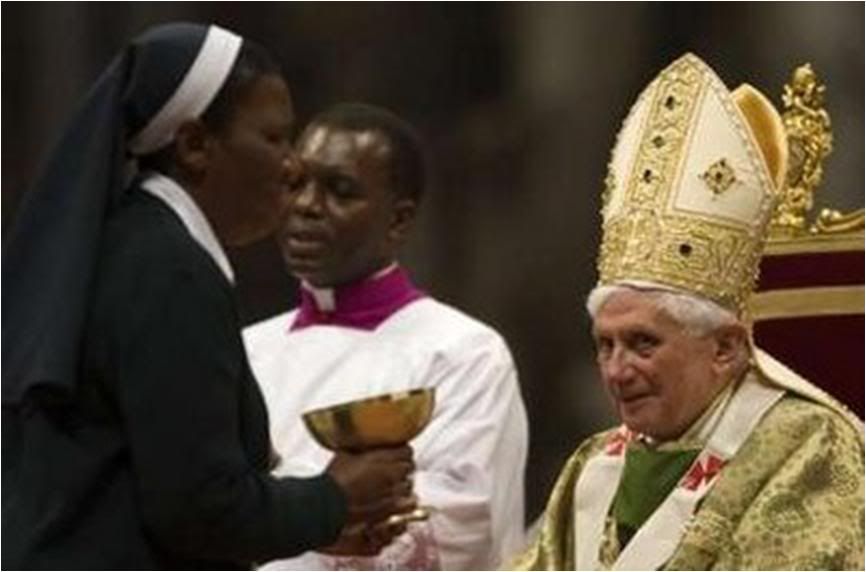
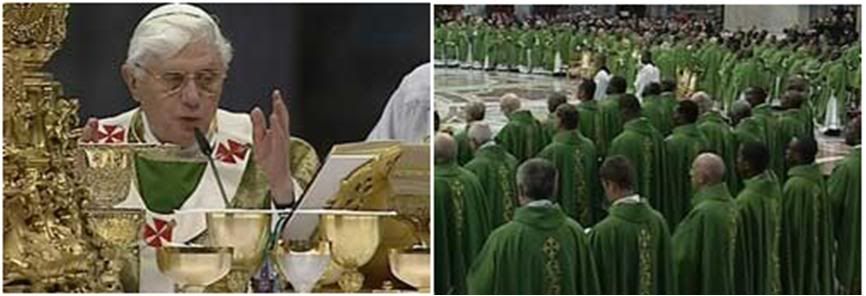
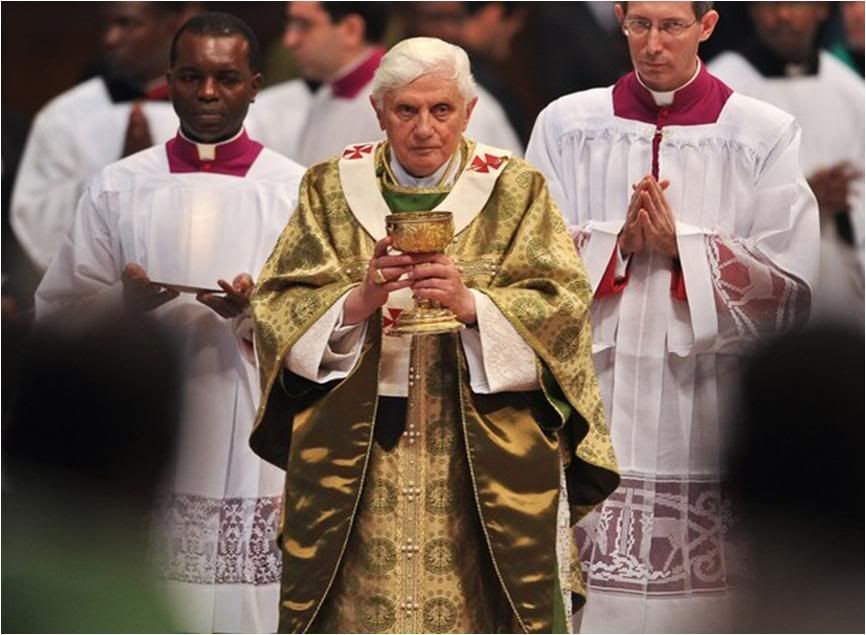
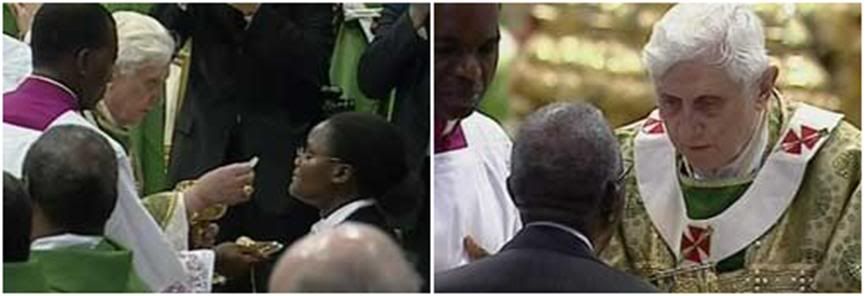
[Modificato da TERESA BENEDETTA 04/10/2009 22:25]